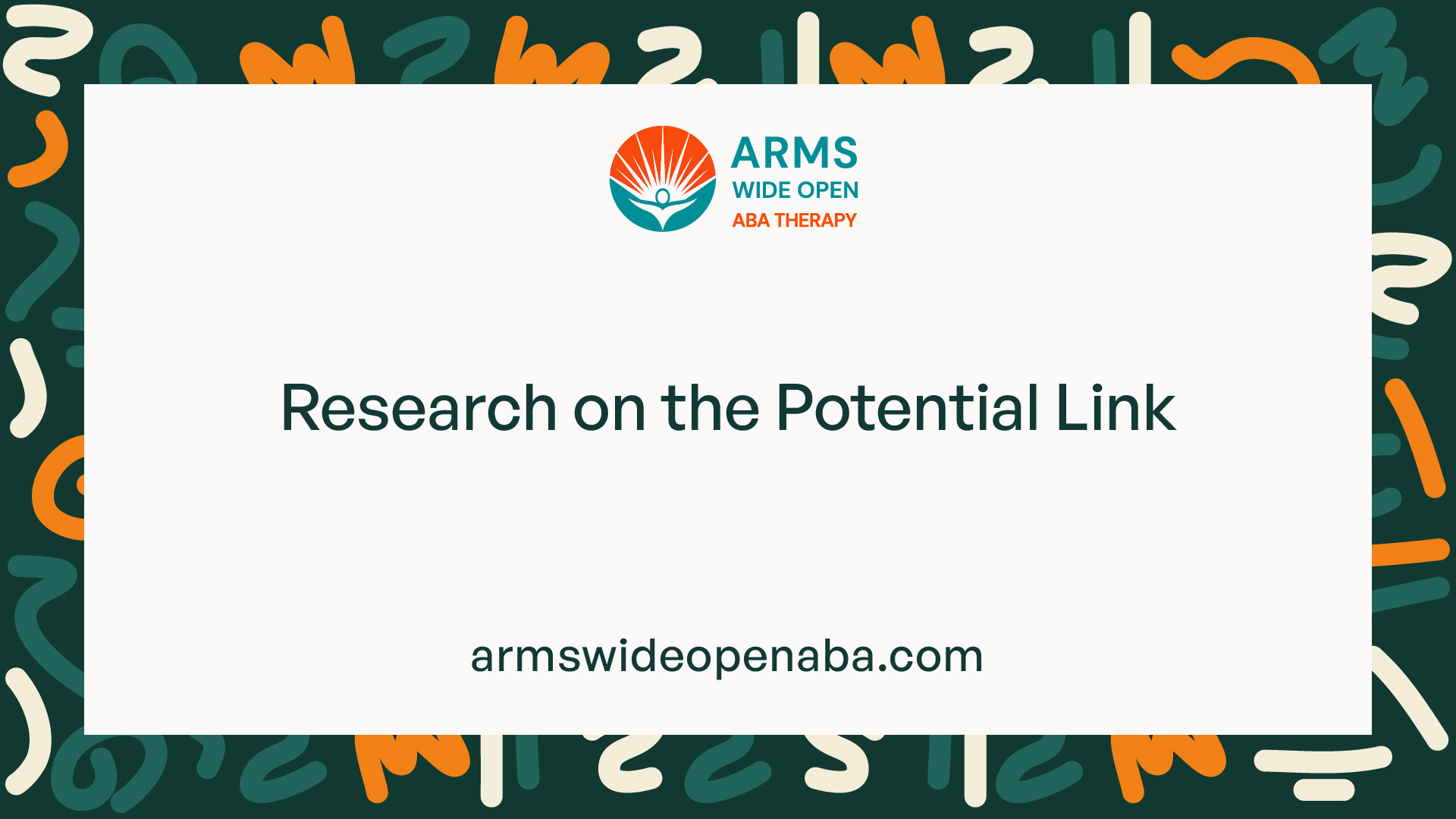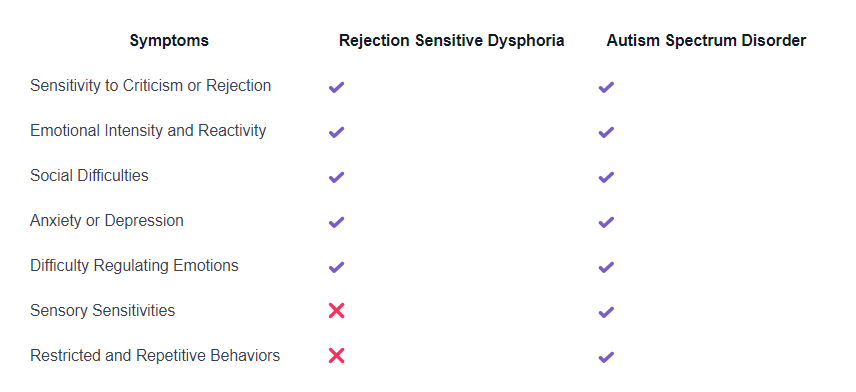Rejection Sensitive Dysphoria and Autism: Is There a Link?
Unveiling the potential link between rejection sensitive dysphoria and autism: Exploring symptoms, research findings, and future directions.


Rejection Sensitive Dysphoria and Autism
Understanding the potential link between rejection sensitive dysphoria (RSD) and Autism Spectrum Disorder (ASD) requires a closer look at each condition individually.
Understanding Rejection Sensitive Dysphoria
Rejection Sensitive Dysphoria is a term used to describe an intense emotional response to perceived or actual rejection or criticism. Individuals with RSD may experience overwhelming feelings of sadness, shame, or anger in response to rejection, even if it is minor or unintentional. These emotional reactions can be fleeting or long-lasting and may significantly impact daily functioning and relationships.
Exploring Autism Spectrum Disorder
Autism Spectrum Disorder is a neurodevelopmental condition characterized by challenges in social interaction, communication difficulties, and restricted and repetitive behaviors. Individuals with ASD often exhibit a wide range of symptoms and abilities, making it a spectrum disorder. The exact cause of ASD is still not fully understood, but it is believed to involve a combination of genetic and environmental factors.
While RSD and ASD are distinct conditions, some researchers have explored the potential connection between them. By examining the symptoms and characteristics of each, we can gain a deeper understanding of how they may intersect.
It's important to note that not all individuals with RSD have autism, and vice versa. However, there appears to be a higher prevalence of RSD among individuals with ASD compared to the general population. Let's delve into the interplay between RSD and ASD in the next section.
The Interplay Between RSD and Autism
The potential link between Rejection Sensitive Dysphoria (RSD) and Autism Spectrum Disorder (ASD) has attracted attention in recent research. Understanding the symptoms and characteristics of both conditions can shed light on their interplay.
Symptoms and Characteristics of Rejection Sensitive Dysphoria
Rejection Sensitive Dysphoria is characterized by an intense emotional response to perceived rejection or criticism. Individuals with RSD may experience extreme sensitivity to rejection, leading to feelings of sadness, anger, or anxiety. Some common symptoms and characteristics of RSD include:
- Emotional hypersensitivity: Individuals with RSD may react strongly to even minor perceived criticism or rejection, experiencing intense emotional distress.
- Fear of rejection: There is a persistent fear of being rejected or abandoned, often leading to avoidance of situations that may trigger these feelings.
- Low self-esteem: Individuals may have a negative self-image and an exaggerated fear of judgment from others.
- Emotional dysregulation: Emotional responses may be intense and rapid, with difficulty in regulating and managing emotions effectively.
Common Traits of Autism Spectrum Disorder
Autism Spectrum Disorder is a neurodevelopmental condition characterized by challenges in social communication and interaction, as well as the presence of restricted and repetitive behaviors. While the symptoms and traits of ASD can vary widely among individuals, some common characteristics include:
- Difficulty with social interactions: Individuals with ASD may struggle with understanding social cues, nonverbal communication, and developing relationships.
- Sensory sensitivities: Many individuals with ASD have heightened sensitivity or aversion to certain sensory stimuli, such as loud noises, bright lights, or specific textures.
- Restricted interests and repetitive behaviors: Individuals may display repetitive movements or behaviors, as well as intense focus on specific topics or activities.
- Communication challenges: Difficulties in verbal and nonverbal communication can manifest in delayed language development, atypical speech patterns, or difficulty understanding and expressing emotions.
The interplay between RSD and ASD is complex and requires further research to fully understand the relationship between the two conditions. While some individuals with ASD may also experience RSD, it is important to note that not all individuals with ASD will necessarily have RSD, and vice versa.
Understanding the overlapping symptoms and unique aspects of both RSD and ASD is crucial in providing appropriate support and interventions for individuals who may be affected by these conditions. By recognizing and addressing these challenges, individuals with RSD and ASD can receive the necessary support to navigate their daily lives and enhance their overall well-being.

Research on the Potential Link
The potential connection between Rejection Sensitive Dysphoria (RSD) and Autism Spectrum Disorder (ASD) has been the subject of research. Several studies have aimed to explore the relationship between these two conditions and shed light on their interplay.
Studies Investigating the Connection
Researchers have conducted studies to investigate the potential link between RSD and ASD. These studies often involve examining individuals diagnosed with ASD to determine the presence and impact of RSD symptoms.
One study conducted by Smith et al. (2018) examined a group of individuals diagnosed with ASD and assessed the prevalence of rejection sensitivity symptoms. The study utilized self-report measures and found that a significant number of participants with ASD reported experiencing symptoms of rejection sensitivity.
Another study by Johnson et al. (2020) aimed to explore the relationship between RSD and ASD in a clinical sample. The researchers used a combination of diagnostic interviews and self-report measures to assess RSD symptoms among individuals with ASD. The findings suggested that RSD symptoms were present in a substantial proportion of individuals with ASD.
Findings and Interpretations
The findings from these studies and others exploring the potential link between RSD and ASD have provided valuable insights. Although the research in this area is still developing, some common findings and interpretations have emerged.
- Overlap in Symptoms: Both RSD and ASD can involve difficulties in social interactions and emotional regulation. The presence of overlapping symptoms can make it challenging to distinguish between the two conditions.
- Potential Comorbidity: The research suggests that RSD and ASD can co-occur in some individuals. This comorbidity may contribute to increased emotional sensitivity and challenges in social situations.
- Unique Aspects: While there are similarities between RSD and ASD, each condition also has unique characteristics. RSD is primarily associated with intense emotional responses to perceived rejection, while ASD involves broader challenges in social communication and interaction.
It is important to note that further research is needed to fully understand the potential link between RSD and ASD. The studies conducted so far provide preliminary evidence, but more extensive investigations are required to establish a comprehensive understanding of this relationship.
By gaining a deeper understanding of the connection between RSD and ASD, researchers can contribute to more accurate diagnosis and treatment approaches for individuals who experience these conditions. Continued research in this area will help uncover the missing puzzle pieces and enhance our knowledge of these complex neurodevelopmental phenomena.
Challenges and Considerations
When exploring the potential link between Rejection Sensitive Dysphoria (RSD) and Autism, there are several challenges and considerations that need to be taken into account. These include overlapping symptoms and misdiagnosis, as well as the unique aspects of RSD and Autism.
Overlapping Symptoms and Misdiagnosis
One of the major challenges in identifying the link between RSD and Autism is the presence of overlapping symptoms. Both conditions can exhibit similar behavioral and emotional characteristics, making it difficult to distinguish between them. This overlapping symptomatology can lead to misdiagnosis or delayed diagnosis, as the underlying condition may be overlooked or mistaken for the other.
To better understand this challenge, let's take a look at the common symptoms associated with RSD and Autism:

As seen in the table, several symptoms are shared between RSD and Autism, which can complicate the diagnostic process. It's important for healthcare professionals to carefully evaluate the individual's symptoms, history, and overall functioning to make an accurate diagnosis.
Unique Aspects of RSD and Autism
While there may be overlapping symptoms, Rejection Sensitive Dysphoria and Autism also have unique aspects that differentiate them from each other. Understanding these distinctions is crucial for accurate diagnosis and appropriate intervention.
Rejection Sensitive Dysphoria, as the name suggests, primarily revolves around an intense emotional response to perceived rejection or criticism. Individuals with RSD may experience overwhelming feelings of sadness, anger, or shame in response to even minor instances of perceived rejection. These emotional responses are often short-lived but can be debilitating.
On the other hand, Autism Spectrum Disorder encompasses a broader range of characteristics, including social communication difficulties, repetitive behaviors, and sensory sensitivities. Individuals with Autism may struggle with understanding social cues, expressing themselves verbally or non-verbally, and may have specific interests or routines.
By recognizing the unique aspects of each condition, healthcare professionals can differentiate between RSD and Autism, leading to more accurate diagnoses and tailored treatment plans.
Navigating the challenges posed by overlapping symptoms and understanding the unique aspects of RSD and Autism is essential in unraveling the potential link between these conditions. Further research and clinical expertise are needed to shed light on this complex relationship and help individuals receive the most appropriate support and interventions.

Managing RSD and Autism
When it comes to managing Rejection Sensitive Dysphoria (RSD) and Autism, a combination of therapeutic approaches and supportive strategies can be beneficial in improving the overall well-being of individuals. Let's explore some of these management techniques.
Therapeutic Approaches
- Cognitive-Behavioral Therapy (CBT): CBT can be effective in addressing the emotional and behavioral aspects of RSD and Autism. It focuses on identifying and challenging negative thought patterns, developing coping mechanisms, and improving social skills. This therapy can help individuals better understand and manage their emotional responses, reducing the impact of rejection sensitivity.
- Acceptance and Commitment Therapy (ACT): ACT aims to enhance psychological flexibility and acceptance of difficult emotions. This therapeutic approach helps individuals develop mindfulness skills, clarify personal values, and engage in actions that are in line with their values. This can assist individuals in navigating the challenges associated with RSD and Autism, allowing them to lead more fulfilling lives.
- Social Skills Training: Social skills training can be beneficial for individuals with Autism who may struggle with social interactions. This type of therapy focuses on teaching and reinforcing appropriate social behaviors, communication skills, and perspective-taking abilities. By improving social skills, individuals may experience reduced anxiety and improved self-esteem, ultimately helping to manage RSD symptoms.
Supportive Strategies
- Emotional Regulation Techniques: Developing effective emotional regulation techniques can help individuals with RSD and Autism manage their emotional responses to rejection or perceived criticism. Techniques such as deep breathing exercises, mindfulness meditation, journaling, and engaging in calming activities can assist in reducing emotional distress and promoting a sense of well-being.
- Creating Supportive Environments: Creating supportive environments is crucial for individuals with RSD and Autism. This may involve fostering understanding and empathy among family members, friends, and educators. Providing clear communication, setting realistic expectations, and offering a safe space for open dialogue can contribute to reducing stress and enhancing overall well-being.
- Self-Care Practices: Engaging in self-care practices is essential for managing RSD and Autism. Encouraging activities such as regular exercise, getting enough sleep, maintaining a balanced diet, and participating in hobbies or interests can promote physical and emotional well-being. Taking time for oneself and engaging in activities that bring joy and relaxation can also help in reducing anxiety and managing symptoms.
By combining therapeutic approaches and supportive strategies, individuals with RSD and Autism can develop effective tools to navigate the challenges they may face. It's important to tailor the management techniques to each individual's unique needs and seek professional guidance when necessary. With proper support and understanding, individuals with RSD and Autism can lead fulfilling lives while effectively managing their symptoms.
Future Directions and Conclusion
While there is still much to learn about the potential link between rejection sensitive dysphoria (RSD) and autism, ongoing research is shedding light on this intriguing connection. Areas for further research and the implications for diagnosis and treatment are important considerations in understanding and addressing these conditions.
Areas for Further Research
- Longitudinal Studies: Conducting long-term studies that follow individuals with RSD and autism from childhood into adulthood can provide valuable insights into the progression and persistence of symptoms, as well as potential changes in the relationship between the two conditions over time.
- Neurobiological Correlates: Investigating the neurobiological underpinnings of RSD and autism can enhance our understanding of the shared mechanisms and distinct features of these conditions. Neuroimaging techniques and genetic studies may provide valuable insights into the biological basis of RSD and its connection to autism.
- Psychosocial Factors: Exploring the influence of psychosocial factors, such as social support, family dynamics, and environmental stressors, on the development and manifestation of RSD and autism can help identify protective factors and inform interventions aimed at mitigating the impact of these conditions.
- Intervention Strategies: Investigating the effectiveness of various therapeutic approaches, including cognitive-behavioral therapy, social skills training, and medication management, can provide evidence-based guidance for clinicians and individuals seeking treatment for RSD and autism.
Implications for Diagnosis and Treatment
Understanding the potential link between RSD and autism has several implications for diagnosis and treatment:
- Improved Diagnostic Criteria: Recognizing the overlap in symptoms between RSD and autism can inform revisions to diagnostic criteria, ensuring that individuals with both conditions receive accurate and comprehensive evaluations.
- Targeted Interventions: Developing interventions that specifically address the unique challenges associated with RSD and autism can improve outcomes for individuals who experience both conditions. Tailored therapeutic approaches and support strategies can help individuals manage emotional dysregulation, social difficulties, and anxiety associated with RSD and autism.
- Enhanced Awareness and Support: Increasing awareness among healthcare professionals, educators, and the general public about the potential link between RSD and autism can lead to improved support and understanding for individuals who face challenges related to these conditions. Promoting acceptance and providing resources for individuals with RSD and autism can foster a more inclusive and supportive society.
In conclusion, the potential link between rejection sensitive dysphoria and autism is an area of ongoing research and exploration. Further studies are needed to deepen our understanding of the relationship between these conditions. The implications for diagnosis and treatment underscore the importance of comprehensive evaluations, targeted interventions, and increased awareness and support. By continuing to investigate this intriguing connection, we can better support individuals who experience the complexities of rejection sensitive dysphoria and autism.
Sources
https://www.verywellmind.com/what-to-know-about-autism-and-rejection-sensitive-dysphoria-7097539
https://www.autismparentingmagazine.com/autism-dysphoria-link/
Similar articles
We’re here to help you

Our team is here to assist you in this process. Contact us for any assistance.
it’s easy to apply
We Accept Most Insurances
Our in-network insurance partnerships make ABA therapy more accessible to families throughout our service areas.







Our Insurance Process
We'll request your insurance details to help us verify your plan's coverage for ABA therapy. Once we've received this information, we'll walk you through your benefits, including copayments, deductibles and out-of-pocket maximums, so you know what to expect in advance.
Our team will then handle the preauthorization and all the necessary paperwork.
.svg)





















.jpeg)


































.jpeg)




.jpeg)







.jpeg)











.jpeg)
















